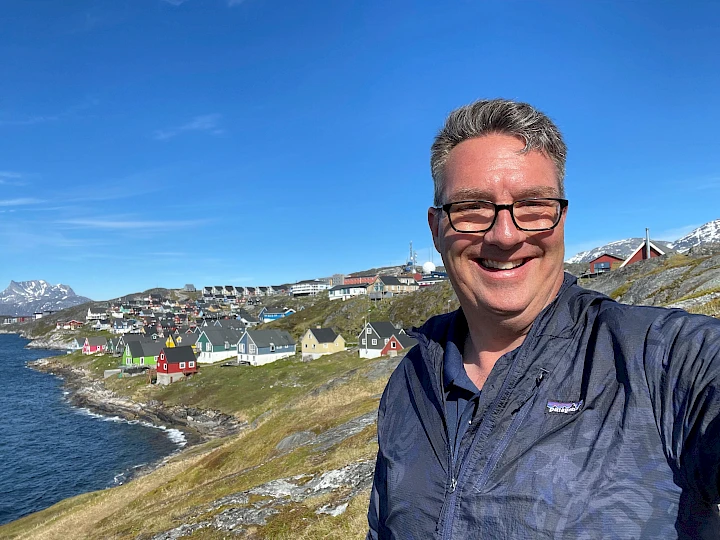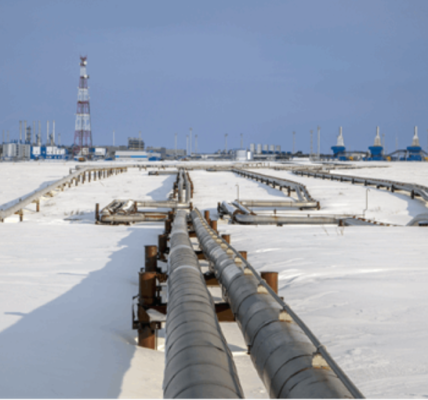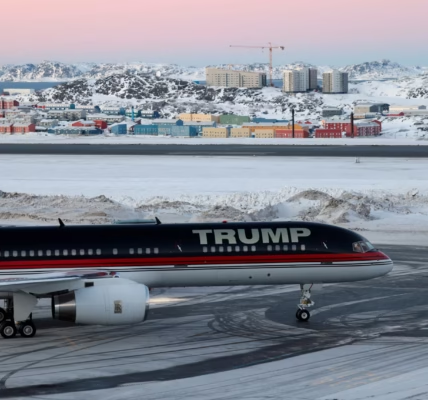Benjamin Strong steps into the pivotal role of Chair for the Arctic EPPR Working Group, aiming to strengthen cooperation on safety and disaster response across the Arctic region
With a paramedic and Coast Guard background, Ben Strong brings with him an expertise in Arctic search and rescue and a passion for helping people. Learn about Ben Strong, his ambitions for the Working Group and key focus areas for the years ahead.
What is EPPR’s work focused on?
EPPR’s work has evolved over the years. It started with a strong focus on oil spill response in the Arctic. Over the years, search and rescue and radiological response in the Arctic also became big priorities. Disasters like wildfires and also public health preparedness have also come into focus. Now, I would say that EPPR is looking into all-hazards emergency management in the Arctic.

© Benjamin Strong
What is your background and how did you become involved with EPPR?
When I was a kid, I watched a TV show called Emergency with two paramedics named Johnny and Roy. I knew then, watching this 1970s television show, that this is what I was going to do for the rest of my life. And I did go on to become a paramedic. So, thank you, Johnny and Roy!
My background with EPPR started in 2010. As the U.S. Coast Guard’s international search and rescue expert, I recognized that the Arctic was becoming more accessible while at the same time, search and rescue resources were limited. The U.S. Coast Guard has a program that uses commercial ships for search and rescue where traditional helicopters or national search ships are unavailable, and I wanted to share that with EPPR. I reached out to the Chair at the time, and they were interested and invited me to a meeting. From there I continued to participate in EPPR meetings.
I became involved before search and rescue was even a mandate. There was a recognition that if there’s an accident in the Arctic, we need to be empowered and prepared. In 2011 the Search and Rescue agreement (Agreement on Cooperation on Aeronautical and Maritime Search and Rescue in the Arctic) was negotiated under the auspices of the Arctic Council, which really solidified the SAR mandate within EPPR.
“Emergency response is something that has to occur in minutes and hours, but the preparation takes weeks, months and years of cooperation.”Benjamin Strong
What inspires you about EPPR’s work?
I’m a helper. I’ve always been taught that you help others before you help yourself. The Arctic is beautiful, it’s remote, it’s fragile and it’s important, and I can’t think of a better way to experience that feeling you get when you’re helping and combining that with the adventure and remoteness of the Arctic. It may sound silly, but there’s a sort of romance about the Arctic. It’s dark, it’s sunny, and it’s beautiful. There are incredible people and culture. It has a way of drawing you in and creating a drive to preserve it, so that my kids and their kids can continue to experience it.
What are your ambitions as Chair of EPPR?
My ambition is to continue to highlight the relevance of EPPR. It’s more important now than ever to reinforce the cooperation of all the Arctic States and Indigneous Permanent Participants. My aim is to ensure that at the end of my two-year Chairship, the Working Group has made the Arctic better prepared than when we started.
“It can be daunting to think of all that we need to be prepared for in the Arctic, but we have good people working with EPPR, and it demonstrates the importance of cooperation with all Arctic States.”Benjamin Strong
What are some of EPPR’s projects that we should keep an eye on over the next two years?
Cruise ship rescue is a big, multifaceted topic. There are the challenges of just locating and tracking people in the case of an incident if they end up in the water. There’s also the physical and mental health of the survivors and the responders.
We will also place a focus on building out a more robust radiological response. New energy sources such as small nuclear reactors are being investigated and introduced into small communities in the Arctic, and we have to be prepared to respond to potential incidents related to that.
We also recognize that the Arctic is not just a maritime domain, it’s also terrestrial. There’s permafrost melt and impacts to infrastructure. There are disasters such as wildfires, which require more than just extinguishing – they have other emergency and health response implications. Other disasters we could consider in the Arctic are earthquakes and volcanoes. And of course, we’ll continue to work on oil spill response in the Arctic.
It can be daunting to think of all that we need to be prepared for in the Arctic, but we have good people working with EPPR, and it demonstrates the importance of cooperation with all Arctic States. Emergency response is something that has to occur in minutes and hours, but the preparation takes weeks, months and years of cooperation.
Can you share a memorable Arctic moment?
You know what? Every moment is memorable. I was in Reykjavik, Iceland, coming back from a reception with my colleague, and walking down the street we look up and see the northern lights. We put our heads down just kept walking. But then we noticed everyone around us is stopping in awe. We said to each other, we need to appreciate this more, because for those of us who work or live in the Arctic, we may experience this a lot, but for many, the Arctic can be a one-time opportunity. So, I don’t have a memorable moment. I have a moment that reminded me that all of my moments are memorable.





Hey everyone! 🌟 It’s super interesting to see how the EPPR Working Group has evolved over the years. Starting with oil spill response in the Arctic was just the tip of the iceberg! 🧊 Now they’re tackling everything from search and rescue to wildfires and even public health. It’s awesome that they’re broadening their scope to all-hazards emergency management. Makes you realize how interconnected everything is, right? Keep up the great work, EPPR! 💪✨
We are excited to share that the Emergency Prevention, Preparedness and Response (EPPR) Working Group has significantly evolved its focus over the years! Initially centered on oil spill response in the Arctic, our priorities have expanded to include critical areas such as search and rescue operations and radiological response. In light of recent challenges, we’ve also prioritized disaster readiness for wildfires and public health emergencies.
Today, EPPR is committed to an all-hazards approach to emergency management in the Arctic. This holistic perspective allows us to address a wider range of potential threats while enhancing our resilience in the face of adversity. Stay tuned for more updates as we continue our vital work in safeguarding our communities! 🌍💪
It’s truly inspiring to see how the EPPR Working Group has evolved over the years! Expanding from oil spill response to encompass a broader range of emergencies shows a deep commitment to safeguarding our Arctic communities. Every step towards all-hazards emergency management is a step in the right direction!
Kudos to the EPPR Working Group for recognizing the diverse challenges we face in the Arctic! The shift towards all-hazards emergency management reflects a proactive approach that will undoubtedly enhance our preparedness and response capabilities. Your hard work and dedication are making a real difference!
It’s inspiring to see how far the EPPR Working Group has come—from oil spills to a comprehensive all-hazards strategy! This evolution reflects our understanding of the complex challenges facing the Arctic region today. We must champion this initiative, ensuring that it receives the attention and resources it deserves so that we can protect both people and ecosystems effectively.
The shift towards an all-hazards emergency management strategy by the EPPR Working Group is both timely and necessary. With the increasing frequency of wildfires and other disasters, we can’t afford to be reactive; we need a robust framework that anticipates various emergencies. Supporting this holistic approach will not only enhance our response capabilities but also strengthen community resilience across the Arctic.
It’s impressive to see how the EPPR Working Group has adapted over the years! The evolution from oil spill response to encompassing all-hazards emergency management truly reflects the growing complexities of challenges in the Arctic. This proactive approach is essential for safeguarding our communities and ecosystems.
The EPPR Working Group’s evolution highlights the importance of adaptability in emergency management careers. As new threats emerge, it’s crucial for professionals in this field to expand their skill sets and knowledge base—something that EPPR exemplifies beautifully!
I’m so thankful for the progress made by the EPPR Working Group! The shift towards an all-hazards approach reflects a deep understanding of the complexities we face in the Arctic today. Your commitment ensures that we are better prepared for whatever challenges may come our way.
I want to express my heartfelt gratitude for the EPPR Working Group’s efforts over the years. The transition from a narrow focus on oil spills to embracing an all-hazards approach demonstrates true leadership in emergency preparedness. It’s reassuring to know that our Arctic regions are in such capable hands!
Thank you to the EPPR Working Group for your unwavering commitment to emergency management in the Arctic! Your work in adapting to various challenges, from wildfires to radiological responses, shows a remarkable dedication to keeping our environment and people safe. I truly appreciate all that you do!